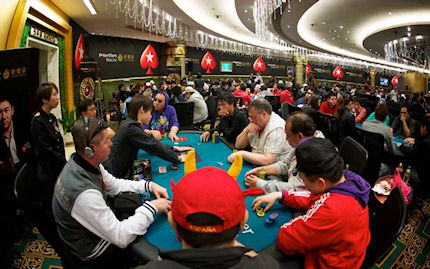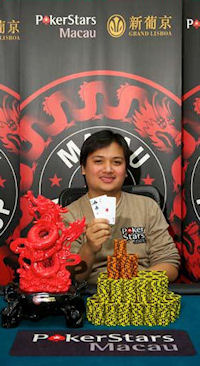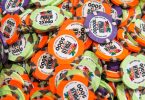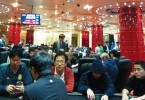This article first appeared in the May/Jun 2011 issue of World Gaming magazine.
It has taken a few years but it is finally safe to say that the poker boom has hit Macau and the PokerStars room at the Grand Lisboa is its epicenter.
The PokerStars Macau poker room at the Grand Lisboa hums with excitement. Players are pushing their way to the front of the line for one of the last remaining seats in an event. Players are decked out with their personal music players and expensive noise-cancelling headphones. Caps, sunglasses and stick on patches promoting online poker sites or new poker products are now common sites in this poker room. TV crews, cameramen and online bloggers are waving their hands, jotting down notes and conducting interviews with the new stars of the sport. Magazines like our very own report on the big winners, creating overnight celebrities and further fuelling the buzz. This is what poker felt like at the start of the boom in places like the US, England and Australia. This is common place in the world of poker and now it’s Macau’s turn to soak it all in.

In the last eight years poker has swept its way across the world. It has been an impressive rise for a game that was struggling to find its place 20 years ago. It spread through the western world after exploding on the American gaming scene in the early 2000s. Pessimists had likened poker to a fad such as the yo-yo or the hula-hoop and said that the game would soon crawl back into obscurity. More fool them.
After Eastern Europe and South America embraced the game, the poker world held its breath to see what would happen in the final frontier: Asia. Opinions were divided with some viewing it as a gold-rush-in-waiting, while others were concerned about the cultural divide. The possibilities seemed endless if operators were able to overcome the concerns about poker in this part of the world. The question was how much needed to be spent on developing poker in Asia before the expected boom occurred.
No one invested more time or money than PokerStars developing the game here in Asia and especially Macau. So it should come as no surprise that they are the first operators to show an incredible turnaround in the fortunes of the game. Early in the piece PokerStars’ threw buckets of money at the Asia Pacific Poker Tour (APPT) demonstrating a commitment to educating the market. Asians have largely grown up with mahjong and other Asian games. They didn’t grow up playing poker for matchsticks like most westerners. This meant that they had to learn the game from scratch.
The first home of the APPT in Macau was the Grand Waldo in Cotai way back in 2007. In the inaugural year the license was for tournament poker only. Even though the tournament was deemed an international success it was evident that it would take some dedicated people quite a few years for poker to get rolling from a local perspective. PokerStars opened the PokerStars Macau Poker Room at the Grand Waldo but quickly moved it to the Grand Lisboa where it remains today. The journey was underway.

Filipino Mark Benasa posing for the iconic winner’s shot
MACAU POKER CUP
Since its inception in May 2008 the Macau Poker Cup, with its signature Red Dragon event, has consistently grown in numbers. It took almost 12 months to reach the magical 100-runner mark, showing that initial growth would be gradual.
By 2010 local players were becoming used to competing in large multi-table tournaments. But 2011 may forever be remembered as the breakthrough year for poker in this part of the world. The February Red Dragon saw over 500 runners take their seat and the prize pool sky-rocketed to over HK$5 million.
Filipino Mark Benasa became the first player from that country to win a Red Dragon event, taking home HK$1.1 million as last man standing from the monster 509 player field.
MACAU MILLIONS
The Macau Millions is a different event and one that encourages players to play multiple day 1s to qualify to the later stages of the tournament. This tournament has only been running for two years but the numbers speak for themselves:
|
Year
|
Entries
|
Prize pool HK$
|
|---|---|---|
|
2010
|
741
|
1,467,180
|
|
2011
|
1,329
|
2,631,420
|
2011 saw over 1,300 entries from over 700 unique players. This is the record for the most entries in any poker tournament in Asia, and is staggering compared to the struggling numbers experienced back in 2008.
The historic 2011 event was won by Taiwan’s Hung-Sheng “Shaq” Lin, who picked up HK$400,000 for the victory. Incredibly, Lin also placed third in the February 2011 Red Dragon event and the combination of the two big results see him currently sitting on top of the race for the 2011 Asian Player of the Year.
The APPT brought international players to play in Macau but the Macau Poker Cup and the Macau Millions have bought the ‘world of poker’ to Macau. These events introduced the game properly to the average Asian poker player and have given local Asian emerging stars a happy hunting ground in which to ply their trade. The creation of the Asian Player of the Year (APOY) award has also been a major participation driver and has raised poker’s profile. It didn’t hurt that the inaugural APOY in 2009 was won by a female player, Kitty Kuo from Taiwan, and in 2010 the APOY was rising international star and Team PokerStars Asia player, Bryan Huang.
The game continues to see huge growth not only in Macau but also in mainland China, Hong Kong, Taiwan, Korea and Japan. Players are even taking annual leave from their jobs to travel to Macau and compete in these events. Any poker scene needs local ownership. Now that a regular schedule has stabilised and a spiritual home for tournament poker has emerged, that ownership and sense of community has arrived. Casinos are also realising that hosting a big poker tournament at their property means a guaranteed spike in gaming turnover on their gaming floor, and a guaranteed 100 percent occupancy rate in their hotel. The biggest challenge for PokerStars Macau at the Grand Lisboa is whether they can find enough room to cater for the everincreasing demand.

All in must win
Online poker has played a huge role in helping local Asian players learn the game. Online sites like PokerStars are providing a safe environment for new players to learn the basics of the game in the comfort and convenience of their own homes. They can play on free-to-play tables to learn the game and then graduate to play for money when they feel more confident. There are also plenty of online satellites where players can win their way into major live events like the Macau Millions, Macau Poker Cup and APPT. In addition to the freeroll entries up for grabs, there is a wide range of cash satellites for more serious players. Online poker is hugely advantageous for new players as they gain a lot of ‘hand experience’ quickly, before making their way to the slower but more intense tables of the big live tournaments.
Early work from notable individuals such as Jeffrey Haas and David Jung can’t be overlooked, but today it is Danny McDonagh and Fred Leung who steer the ship at PokerStars Macau. Danny is one of the world’s leading tournament directors and he originally learnt his trade at Crown Casino in Melbourne, the home of the hugely successful Aussie Millions. In recent years Danny has become the number one authority in regards to tournament poker in this part of the world. Pokerstars Macau is operating in a town that has struggled to support and adapt to the poker culture, but they have managed to make it work admirably.
So where to now for the game of poker in Macau? It will continue to grow as tournament and live action numbers increase. You can’t become an overnight celebrity playing baccarat but you can by playing poker and this is part of the allure for players. Not only can you win huge amounts of money you can also become a professional and travel the world playing against the world’s best.
Poker is not just about luck. There’s a sizeable element of skill, so it’s about learning the game and having the courage to play your best regardless of the pressure. Building a poker culture isn’t about luck either, and the poker players in Macau are enjoying a popularity explosion like nothing before. And this could be just the beginning.







